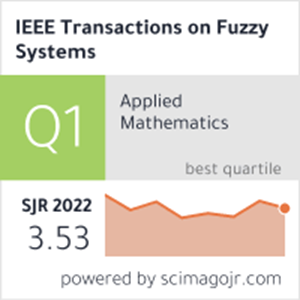Uncertainty-Aware Superpoint Graph Transformer for Weakly Supervised 3-D Semantic Segmentation
IF 10.7
1区 计算机科学
Q1 COMPUTER SCIENCE, ARTIFICIAL INTELLIGENCE
引用次数: 0
Abstract
Weakly supervised 3-D semantic segmentation has successfully mitigated the labor-intensive and time-consuming task of annotating 3-D point clouds. However, reliably utilizing the minimal point-wise annotations for unlabeled data in complex and large-scale scenes is still challenging, such as only 20 points labeled in 2 million points. To tackle this challenge, we propose a new Uncertainty-aware Superpoint Graph Transformer (UaSGT) framework that utilizes minimal annotations for unlabeled data learning through reliable long-range supervision propagation from labeled superpoints to unlabeled superpoints. First, we propose a superpoint graph transformer to achieve long-range supervision propagation along the attention-based fuzzy subsets defined on superpoints. The attention-based fuzzy subset measures the membership of unlabeled superpoints to clusters centered on labeled superpoints. Second, we employ an uncertainty-aware membership rectification technique on the fuzzy subset to ensure reliable propagation among superpoints within the same category. This technique integrates an uncertainty prediction module to mask the influence of unreliable membership and a spatial prior refinement module to reduce uncertainty in intraclass membership degrees. Finally, experimental results on two large-scale benchmarks S3DIS and ScanNet-V2 demonstrate the superiority of our approach compared to the state-of-the-art with at least 90% annotation reduction, and our method also achieves comparable performance to fully supervised methods with less than 0.1% labeled points.弱监督三维语义分割的不确定性感知叠加点图变换
弱监督三维语义分割成功地减轻了对三维点云进行标注的费时费力的工作。然而,在复杂和大规模的场景中,可靠地利用最小的逐点注释对未标记的数据仍然是一个挑战,例如在200万个点中只有20个点被标记。为了解决这一挑战,我们提出了一个新的不确定性感知Superpoint Graph Transformer (UaSGT)框架,该框架通过可靠的远程监督传播从标记的Superpoint到未标记的Superpoint,利用最小的注释进行无标记数据学习。首先,我们提出了一个叠加点图转换器,以实现在叠加点上定义的基于注意力的模糊子集上的远程监督传播。基于注意力的模糊子集度量未标记超点与以标记超点为中心的聚类的隶属度。其次,我们在模糊子集上采用不确定性感知的隶属度校正技术,以确保在同一类别内的超点之间可靠传播。该技术集成了不确定性预测模块来掩盖不可靠隶属度的影响,以及空间先验优化模块来降低类内隶属度的不确定性。最后,在两个大型基准测试S3DIS和ScanNet-V2上的实验结果表明,与最先进的方法相比,我们的方法具有至少90%的注释减少的优势,并且我们的方法也达到了与少于0.1%标记点的完全监督方法相当的性能。
本文章由计算机程序翻译,如有差异,请以英文原文为准。
求助全文
约1分钟内获得全文
求助全文
来源期刊

IEEE Transactions on Fuzzy Systems
工程技术-工程:电子与电气
CiteScore
20.50
自引率
13.40%
发文量
517
审稿时长
3.0 months
期刊介绍:
The IEEE Transactions on Fuzzy Systems is a scholarly journal that focuses on the theory, design, and application of fuzzy systems. It aims to publish high-quality technical papers that contribute significant technical knowledge and exploratory developments in the field of fuzzy systems. The journal particularly emphasizes engineering systems and scientific applications. In addition to research articles, the Transactions also includes a letters section featuring current information, comments, and rebuttals related to published papers.
 求助内容:
求助内容: 应助结果提醒方式:
应助结果提醒方式:


